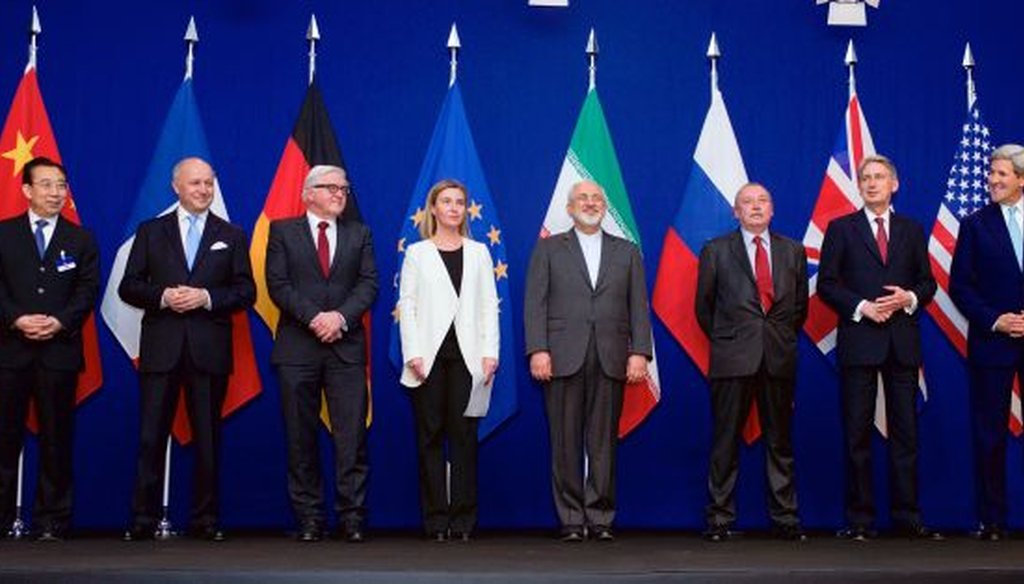Stand up for the facts!
Our only agenda is to publish the truth so you can be an informed participant in democracy.
We need your help.
I would like to contribute
Trump decertifies deal, urges Congress to bolster Iran restraints

Ministers of foreign affairs and other officials announce the framework of a comprehensive agreement on the Iranian nuclear program in Lausanne, Switzerland, on April 2, 2015. (Wikimedia commons)
President Donald Trump formally disavowed the Iran nuclear deal and pressed lawmakers to impose harsh new restraints on the Islamic Republic.
Trump stopped short of withdrawing from the Obama-era deal, under which Iran agreed to scale back its nuclear activity in exchange for sanctions relief. Instead, the Trump administration intends to work with Congress and U.S. allies to "address the deal's many serious flaws," he said.
Some experts saw this step as an opening move toward renegotiating the deal, though they doubted a new agreement would emerge between the United States, Iran and other world powers who brokered the 2015 pact.
"In my view, I think that you can count this as movement," said Richard Nephew, a senior research scholar on global energy policy at Columbia University. "I don't think it will actually result in a renegotiated agreement, so it is hardly progress toward it."
Others believe the meaning behind Trump's new posture on Iran is too vague to pin down with any certainty.
One of the headlines from Trump's speech is that he would decertify the Iran accord. That does not mean he will cancel it.
By law, the Trump administration must report on the deal to Congress every 90 days, including the status of Iran's compliance, and whether it's within U.S. national security interest to continue sanctions relief.
With the administration's October deadline looming, Trump announced Oct. 13 he would decline to certify the deal, as his administration had previously done two times. Trump accused Iran of failing to live up to the "spirit" of the deal, and cited "multiple violations of the agreement." (We previously found that Iran had largely complied with the deal, aside from some minor infractions that were quickly rectified.)
"Based on the factual record I have put forward, I am announcing today that we cannot and will not make this certification," Trump said. "We will not continue down a path whose predictable conclusion is more violence, more terror and the very real threat of Iran's nuclear breakout."
Decertifying opens the door for Congress to quickly reimpose sanctions. If Congress takes that step, experts said, it would effectively end the deal.
Instead of withdrawing from the deal, Trump said he would pursue ways to fix its shortcomings.
Trump is seeking legislation that amends the law that requires congressional review of the deal to include new "trigger points," which if Iran reached, would automatically reimpose sanctions.
Trump said these triggers would aim to strengthen enforcement of the current deal, and would also apply separately to Iran's ballistic missile program. He also expressed support for provisions that would effectively eliminate the nuclear deal's expiration date, and threatened to walk away from the deal if Congress and U.S. allies failed to reach a satisfactory solution.
"I support these initiatives. However, in the event we are not able to reach a solution, working with Congress and our allies, then the agreement will be terminated," Trump said. "It is under continuous review, and our participation can be canceled by me, as president, at any time."
So is the administration's new tack the hard opening line of a negotiation?
"It's not clear whether the president wants to renegotiate the deal, which he is hearing from his advisers is not realistic, or whether he wants to delegitimize it to signal he is 'tough' on Iran," said Lisa Koch, assistant professor of government at Claremont McKenna College. "Or he could be hoping to bring about the deal's slow collapse in a way that allows him to distance himself from the blame."
Trump's new posture toward Iran generates as many questions as it does answers. Time will tell whether the administration's harder line, as well as its pursuit of legislative modifications, will reopen negotiations or effectively alter terms of the deal.
What's certain is Trump's decertification of the deal and legislative push moves this promise from what was essentially static, into a more fluid situation.
So we're changing this rating to In the Works.
Our Sources
President Donald Trump speech, Oct. 13, 2017
PolitiFact, "Is Iran complying with the nuclear deal? For the most part, yes," June 14, 2017
Email interview with Richard Nephew, senior research scholar on global energy policy at Columbia University, Oct. 13, 2017
Email interview with Lisa Koch, assistant professor of Government, Claremont McKenna College, Oct. 13, 2017
Email interview with Daryl Kimball, executive director Arms Control Association, Oct. 13, 2017
